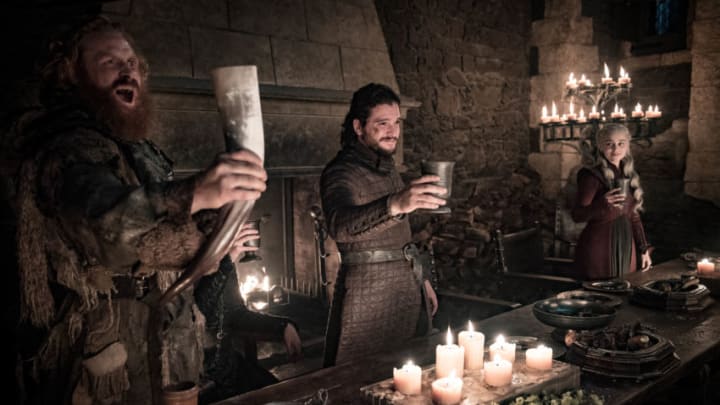I’m sure there will come a day, maybe even soon, when we’re no longer talking about the damn coffee cup that cropped up during the post-Battle of Winterfell feast in “The Last of the Starks,” but this is not that day.
Game of Thrones director David Nutter, the man behind half the episodes in the shows final season, sat down with a bunch of fellow directors for a roundtable discussion organized by The Hollywood Reporter. There were some impressive names there — Ava DuVernay, who’s currently getting raves for When They See Us, her Netflix drama about the Central Park Five; Patty Jenkins, the director of Wonder Woman; Ben Stiller, who apparently is more of a director than I thought — but we’re all here to talk about coffee cup-gate, so let’s hear it.
"The first thing I said was they had changed an angle of the take, so I wasn’t there when they changed it, so I didn’t blame myself, which was good. And then I looked to see if it was maybe mine — it wasn’t. But I think the show is so damn perfect in many respects that people love to find the blemishes, it’s just a little non sequitur that doesn’t really amount to anything at all."
Blame for the coffee cup has been laid at the feet of many an actor and crew member, but a definitive answer eludes us. Nutter is right, of course, that at the end of the day it’s a non sequitur, but you don’t get to choose your legacy.
Anyway, the thrice-damned cup came up when Nutter was talking about reactions to his work, which as a television director he doesn’t get to see as much as he would if he were making movies. “I’ve kind of chosen television because of the quality of the material that I’m offered, not being a writer,” he said. “I’ve turned a lot of features down. The one thing you don’t get is the box office, you don’t get the reviews all the time.”
"But when I did “The Red Wedding,” that was an episode that once I finished it and then I got a chance to watch, there was about a 15-, 20-minute tape that people had compiled, their reactions to the end of the episode. And it’s quite something to see that what I was doing was affecting people in that respect, people jumping up and down on their couches, screaming and yelling and crying. When you get to things like the coffee cup on the table or something, that’s just … she ordered herbal tea and she got coffee, so that was a mistake. (Laughter.)"
Live by the sword, die by the sword; live by the memes, die by the memes.
More substantially, Nutter talked about how he works with actors. “[I]t’s all about taking actors into rooms, talking them through sequences, letting them know what’s going to happen and making sure plenty of rehearsal time is allotted,” he said. “This final season was good because we had all the actors get together at the beginning and we all read the scripts. And then for four days, I blocked out every scene, every two-hander, every group scene they were all in.”
"This year on Game of Thrones, and I’ve had this before, other shows, people’s death is their last scene. And to me that is such an important thing, making sure that they feel comfortable with it. I would always let them know that this is the one, this is the angle, and I’ll keep doing it until you feel comfortable because it’s too important. Because they have to walk away feeling that they contributed to that. I heard a story once that acting is standing in front of a crowd naked and turning around very slowly. (Laughter.) And it really is that."
When you put it like that, nude scenes don’t seem quite as terrifying.
RELATED PRODUCT

Ozzie Smith St Louis Cardinals Game Of Thrones Iron Throne Legends Bobblehead
Buy Now!
Buy Now!
As for a show or movie Nutter thinks every aspiring director should watch, he names The X-Files, which is kind of an out-of-left-field choice but I think I get it. “[I]t was really the first show of its kind that dealt with the extreme possibilities out there that people didn’t really realize was possible and setting it in a real-world tone, which I thought was really well done. It was just the look of the show and the tone of the show was something I thought was a real pioneer as far as that was concerned.”
In a way, you can think of Game of Thrones as the culmination of the TV revolution started by The X-Files and Twin Peaks and the like way back in the early ’90s. Those were two very popular genre shows that blended the line between TV and film. Now, three decades later, red-hot directors like DuVernay are flitting back and forth between the two mediums without a second thought, whereas the spheres used to be completely separate.
Wherever TV goes from here, directors like this will likely be a big part of it.
To stay up to date on everything fantasy, science fiction, and WiC, follow our all-encompassing Facebook page and sign up for our exclusive newsletter.
Watch Game of Thrones for FREE with a no-risk, 7-day free trial of Amazon Channels
